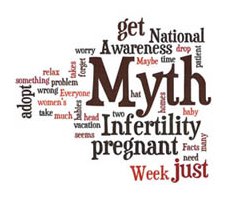 Since 2009, the last week of April has been designated as National Infertility Awareness Week (NIAW).** That means that yesterday, on Easter Sunday, marked the beginning of a week dedicated to bringing attention and providing much-needed education about the disease of infertility.
Since 2009, the last week of April has been designated as National Infertility Awareness Week (NIAW).** That means that yesterday, on Easter Sunday, marked the beginning of a week dedicated to bringing attention and providing much-needed education about the disease of infertility.
My blog has primarily been about my journey through infertility (and now the child-free life I’m living after infertility). Every year during NIAW, I have always found a way to dedicate at least one blog post to help educate my family and friends. Two years ago, it started as one long post that ended up being divided into six daily posts (yes, it was that long).
And last year, RESOLVE partnered with long-time IF blogger, Mel to come up with an overall theme for NIAW. What resulted was Project IF which challenged those IF bloggers to answer the question, “What IF?” My post for 2010, if you’re interested can be found here.
For NIAW 2011, RESOLVE issued another “Call To Action” for IF bloggers. This year, we’ve been asked to properly “Bust an Infertility Myth.” So that’s what I’ll be doing today.
Except, I must fully disclose that what follows is a re-post of a previous blog entry; one that was written last August in response to another post I had just written. This response (which can be found here) represents the misconception … the myth, if you will … that infertility is not a disease.
I felt it appropriate to post that blog entry again, given the challenge that I’ve been given. And even if you have already read the following post … I encourage you to read it again with emphasis on remembering what this week stands for.
And while you’re at it, make sure you head over to RESOLVE to learn more about Infertility and what you can do to help spread awareness about Infertility this week.
~~*~*~*~*~*~*~*~*~*~*~~
Thank you for your comment on my previous post. As always, I welcome any responses to what I write. To me, any response means that I’m effectively getting my words out into the world.
My last post did not mean to belittle Cancer as a disease. And yes, I realize that I was a bit over the top and melodramatic at the end. I truly debated as to whether or not I should respond to you. But then I thought that I should really practice what I preach.
And what I’ve been preaching lately is that it’s better to educate others about Infertility than perpetuating a myth.
In this case, it’s the myth that Infertility is not a disease, but rather just a “condition” that is a result of a “badly dealt hand” in life.
Or as Margaret Wente’s editorial in The Globe and The Mail indicates, “Many things in life are deeply unfair, and infertility is just one of them … … [In the] meantime, record numbers of people are embracing childlessness out of choice. It seems that one person’s deep unfairness is another’s blessed liberation.”
So, as an RN Case Manager … who has not only taken care of many Cancer patients at the hospital and has followed up with them on an ongoing basis after they’ve returned to their homes … let me take the opportunity here to dispell this myth.
1. Let’s first get our definitions straight.
Condition: a usually defective state of health (from Merriam-Webster Online Dictionary)
Disease: a condition of the living animal or plant body or of one of its parts that impairs normal functioning and is typically manifested by distinguishing signs and symptoms (from Merriam-Webster Online Dictionary)
Cancer: a term used for diseases in which abnormal cells divide without control and are able to invade other tissues (from the National Cancer Institute website)
Diabetes: a group of diseases characterized by high blood glucose levels that result from defects in the body’s ability to produce and/or use insulin (from the American Diabetes Association website)
Infertility: a disease of the reproductive system defined by the failureto achieve a clinical pregnancy after 12 months or more of regular unprotected sexual intercourse (as defined by the World Health Organization, as stated by the American Society for Reproductive Medicine website).
2. Now, let’s discuss the difference between a condition and a disease.
Many diseases started out as a being known as a “condition.” Diabetes was a “sugar condition.” Asthma was a “breathing condition.” It’s not until science began to do more research to determine the reason for its abnormal patterns in functioning that a condition came to be called a disease.
To me, this is why giving voice to Infertility and educating the general population is extremely important: so that more research can be done to discover how to effectively and consistently treat Infertility. And when I mean “consistently,” I mean that there should be a specific pathway (or guideline to follow) for treatment of Infertility. Much like there are standards of practice for treatment of the various types of Cancer.
3. Now let me discuss why I think all diseases aren’t fatal, as you’ve indicated.
Eczema isn’t fatal. Scleroderma isn’t fatal. Diabetes isn’t even fatal. What’s fatal is what happens if appropriate treatment is not carried out. That’s when other health conditions (or comorbidities) can add to the complications involving the disease.
Going back to Diabetes: If a Diabetic’s blood sugar isn’t controlled properly, then this could lead to diabetic nephropathy — or kidney disease. This is caused by the kidneys working overtime to filter out protein from the body. Continued overworking can cause kidney failure which could, again if untreated could cause toxicity in the body, ultimately leading to death. But would a pathologist consider diabetes as the cause of death in a situation like this? Likely no; it would most likely be kidney failure as a complication from Diabetes.
Now, substitute diabetes in this situation with, let’s say … pancreatic cancer. Again, pancreatic cancer could more likely be the complicationin a fatal situation such as this.
4. So now let me talk about why I think complications from Infertility can be fatal.
First there’s the idea of an abnormal reproductive system; which, like most diseases, could be caused from a variety of different sources. In this case, it’s during any part of the reproductive cycle. But just for sh*ts and giggles … let’s say that — in determining the cause for Infertility — the woman discovers that she has Ovarian Cancer. Or we find out that the man has Testicular Cancer. Then I could logically assume (as you’ve pointed out) that Infertility can be related to Cancer (or vice versa, for that matter) and any complications that result from Cancer can be fatal.
Or … how about this? Let’s say, in the quest to have a child, a woman who has put her body at risk to become pregnant is suddenly more at risk during her pregnancy because of Pre-ecclampsia. And suddenly it becomes evident that a choice needs to be made as to whether to save the woman or her baby? I know women who have tragically been through this. And I hope, sometime in your life that you might have some empathy for them …
5. And finally, speaking of sympathy … I must point out that sympathy for my Infertility is not what I’m asking from you … or from anyone.
What I really want is empathy. And that would mean that I’d want the understanding from others that Infertility is a disease and it deserves to be recognize. It’s not something to be swept under the rug or ignored.
And quite frankly, I would hope that a person with Cancer would also want empathy rather than sympathy. For me, someone who is sympathetic can only “feel” pity and sorrow for someone’s misfortune. While a person who is empathetic has the ability to recognize, comprehend, perceive and directly feel the emotion of another. Seriously. I’d rather have someone recognize and comprehend how difficult it is to be in my situation than to just simply say (perhaps in their head), “Too bad, so sad.”
So here’s one last set of definitions.
Sympathy: the feeling or mental state brought about by such sensitivity (from Merriam-Webster Online Dictionary)
Empathy: the action of understanding, being aware of, being sensitive to, and vicariously experiencing the feelings, thoughts, and experience of another of either the past or present without having the feelings, thoughts, and experience fully communicated in an objectively explicit manner (from Merriam-Webster Online Dictionary)
So hopefully you now have a better understanding of why I wrote my last post.
I’m not asking for more recognition than what Cancer, with its multitude of community support, already has. I’m just simply asking for recognition.
And finally … just so you know. I am a survivor of Infertility … not because one of my parents suffered from Infertility (because my Mom did ) … and not because I ended up having children (because I didn’t) … I consider myself a survivor because I was able to sustain years of treatment for Infertility and came out the other end of a verrry long tunnel with my dignity (relatively) intact.
Best of luck in wherever your life takes you,
Emily
~~*~*~*~*~*~*~*~*~*~*~~
Related Posts
Emily outs her secret
Emily asks people to pledge
Emily makes you go “Hmmm …


I just hopped over from RESOLVE. I wanted to thank you for your words. Beautifully stated.
Love this, Emily.
Love this post! Some people just don’t get it!
I love this! I think so many people think of infertility as bad luck and not necessarily a disease. It’s incredible frustrating! Thank you for sharing!
http://infertilenanny.blogspot.com/2011/04/bustamyth.html
I’m really happy that this week exists! I’ve found so many great blogs that bring to light so many misconceptions that I didn’t even know existed. Thanks for sharing this one and let’s continue to work to bust these misconceptions whether during this week or any other time.
This was great when you first wrote it. It’s still great. : ) Thanks for giving it a second reading!